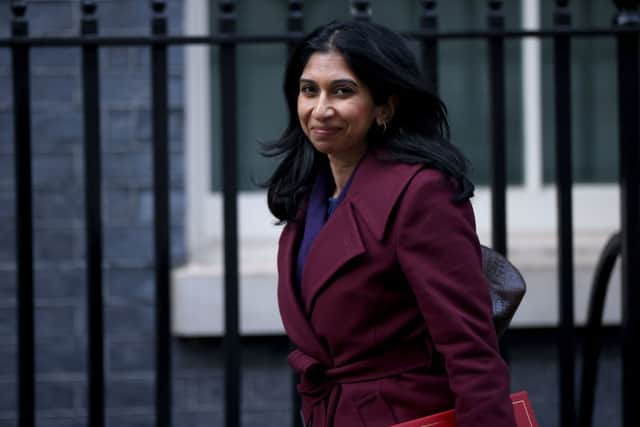Met Police officer convicted of stalking woman while on duty with ‘damning’ Casey Review to be released
and live on Freeview channel 276
A Met Police has been convicted of stalking a woman while on duty, ahead of what is expected to be a “damning” review by Baroness Casey into Scotland Yard’s culture.
PC Jonathan Simon was found guilty of stalking after a two-day trial at Westminster Magistrates’ Court on Friday, which found he had repeatedly harassed the victim - at her home and over the phone - sometimes while on duty as a police officer. The Met said PC Simon remains suspended from duty, and misconduct proceedings will take place “as soon as possible”.
Advertisement
Hide AdAdvertisement
Hide AdThe trial heard PC Simon made repeated visits to the woman’s home, and left her messages and voicemails, despite having been told she did not want to see him anymore. In one instance he attended her home and then her place of work and suggested her window was unsecured in an apparent bid to get her to speak to him.
She was commissioned by the Met to review the culture and standards of the force, following the murder of Sarah Everard by serving officer Wayne Couzens. Since then, even more scandals have enveloped the force, including police officer David Carrick being revealed as one of the country’s worst sex offenders.
Former Met Office Alice Vinten, who served in the force for 10 years, a toxic “lads culture” exists and the job is attractive to bullies chasing power. “I hope that the toxic culture of sexism within the Met will be exposed for the reality it is, the fact that ‘lads culture’ still exists,” she told the PA news agency.


Advertisement
Hide AdAdvertisement
Hide Ad“That women often don’t feel supported by their male colleagues, especially when they do have to make a complaint about a male colleague, men do not often stand behind them.
“The reality is that there is still a stigma attached to reporting ‘one of your own’ and this needs to be turned on its head – officers should be praised for reporting dangerous or corrupt officers, not ostracised for it. I don’t think these issues are specific to the Met at all, I think these things are happening in every force across the UK.
“The focus has been mainly on the Met since the murder of Sarah Everard, however if we gave each UK police service the same level of scrutiny we would find exactly the same issues – sexist jokes, unacceptable WhatsApp discussions, harassment of female officers and men using their power to access vulnerable women.”


The police constable turned author wants to see measures including a unit of female detectives to investigate allegations of sexual offences made by women officers and staff, and a system where two people separately vet job candidates. She said the force also needs to accept that policing attracts power-hungry bullies.
Advertisement
Hide AdAdvertisement
Hide Ad“They need to admit that power attracts bullies and perpetrators, and that the police service as a whole attracts more ‘wrong-uns’ than other occupations,” Ms Vinten said. “They need to admit that they are a profession that is targeted by bad people, who want to abuse their power. Until they do this, and dedicate enthusiastic officers/civil staff to rooting out the bad cops, nothing will change.”
While Home Secretary Suella Braverman has said laws could be changed to make it easier for police chiefs to sack rogue officers. Met Commissioner Sir Mark Rowley has estimated that hundreds of officers in his force have been getting away with misconduct and even criminal behaviour, but he currently has no way of removing them.
Braverman told reporters accompanying her on a visit to Rwanda: “That’s why the inspectorate carried out a wholesale review, not just for the Met but of all police forces, and laid out around 40 recommendations on what police forces should be doing to raise their standards with vetting and processing.
“I’ve announced changes that we are going to make, or consult on at least, on the dismissals process. We have found that it’s very difficult for a chief constable to dismiss an officer… who falls short.
“If the law needs changing, I will do that. But ultimately, we need to ensure that all standards are raised, and the Met Commissioner was really serious about achieving that goal.”
